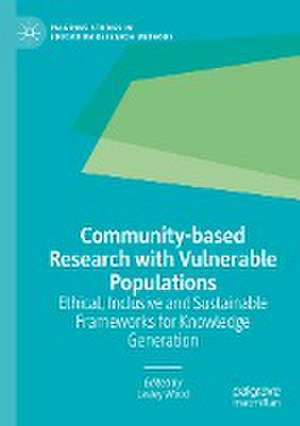Community-based Research with Vulnerable Populations: Ethical, Inclusive and Sustainable Frameworks for Knowledge Generation: Palgrave Studies in Education Research Methods
Editat de Lesley Wooden Limba Engleză Paperback – 19 dec 2022
| Toate formatele și edițiile | Preț | Express |
|---|---|---|
| Paperback (1) | 814.55 lei 3-5 săpt. | +19.65 lei 4-10 zile |
| Springer International Publishing – 19 dec 2022 | 814.55 lei 3-5 săpt. | +19.65 lei 4-10 zile |
| Hardback (1) | 949.10 lei 6-8 săpt. | |
| Springer International Publishing – 18 dec 2021 | 949.10 lei 6-8 săpt. |
Preț: 814.55 lei
Preț vechi: 1018.19 lei
-20% Nou
Puncte Express: 1222
Preț estimativ în valută:
155.86€ • 163.17$ • 128.97£
155.86€ • 163.17$ • 128.97£
Carte disponibilă
Livrare economică 17-31 martie
Livrare express 28 februarie-06 martie pentru 29.64 lei
Preluare comenzi: 021 569.72.76
Specificații
ISBN-13: 9783030864040
ISBN-10: 3030864049
Pagini: 307
Ilustrații: XXVII, 307 p. 12 illus.
Dimensiuni: 148 x 210 x 25 mm
Greutate: 0.44 kg
Ediția:1st ed. 2022
Editura: Springer International Publishing
Colecția Palgrave Macmillan
Seria Palgrave Studies in Education Research Methods
Locul publicării:Cham, Switzerland
ISBN-10: 3030864049
Pagini: 307
Ilustrații: XXVII, 307 p. 12 illus.
Dimensiuni: 148 x 210 x 25 mm
Greutate: 0.44 kg
Ediția:1st ed. 2022
Editura: Springer International Publishing
Colecția Palgrave Macmillan
Seria Palgrave Studies in Education Research Methods
Locul publicării:Cham, Switzerland
Cuprins
Part 1: Community-based Research in Higher Education.- Chapter 1: Community-based Research in Higher Education: Research Partnerships for the Common Good, Lesley Wood and Ortrun Zuber-Skerritt.- Chapter 2: Rethinking Ethical Processes for Community-based Research Partnerships: Lessons from Practice, Mary Brydon-Miller and Lesley Wood.- Chapter 3: Building Capacity for Community-based Research, Lesley Wood.- Part 2: Case Studies of Partnership for Community-based Research with Vulnerable Populations.- Chapter 4: Developing and Sustaining Community-University Partnerships: Reflecting on Relationship Building, Heloise Sathorar and Deirdre Geduld.- Chapter 5: Community-based Research to Enhance Holistic Wellbeing in School Contexts, Ansie Elizabeth Kitching and Robert Tubb Carstens.- Chapter 6: Developing Relationship for Community-based Research at Rhodes University: Values, Principles and Challenges, Diana Hornby and Savathrie Maistry.- Chapter 7: A Community-based Approach to Engaging Older Adults in the Promotion of their Health and Wellbeing Through Social Dance, Orfhlaith Ni Bhriain and Amanda Clifford.- Chapter 8: Community-based Research for Peace: A Case Study in Colombia, Doris Santos.- Chapter 9: An Appreciative Inquiry Approach to Community-based Research for Development of a Social Enterprise, Karen Venter and Alfi Moolman.- Chapter 10: "University Mtaani”: A Case Study of Service Learning and Civic Engagement for Social Transformation in Nairobi’s Informal Settlements, Nkatha Mercy and Jonas Yawovi Dzinekou.- Chapter 11: The Importance of Access, Time and Space: Developing the Collective Change Facilitator Role as Part of a Multi-Partner Research Programme, Sara Branch, Kate Freiberg, Ross Homel and Charmaine Stubbs.- Part 3: A Framework for Conducting Ethical, Inclusive and Sustainable Community-based Research.- Chapter 12: Towards Holistic and Community-led Development: The GULL System for Self-Directed Lifelong Action Learning, Richard Teare.- Chapter 13: Community-based Research with Marginalized Populations as Transformative Adult Education, Lesley Wood.- Chapter 14: An Ethical, Inclusive and Sustainable Framework for Community-based Research in Higher Education, Lesley Wood.
Notă biografică
Lesley Wood is Director of Community-Based Educational Research at North-West University, South Africa. A National Research Foundation rated researcher, she has published over 100 articles, books and chapters in the field of action research for lifelong learning and development.
Textul de pe ultima copertă
This book advocates for community-based research with vulnerable populations within the field of higher education. The chapters outline how research can democratize knowledge generation to make it more accessible and socially relevant, and emphasizes the value of the lived and experiential knowledge of vulnerable and marginalized populations. Rooted in a critique of the current practices of higher education that fail to support participatory and transformative research, the research is structured at micro, macro and meso levels to ultimately emancipate colonized thinking of stakeholders about power, privilege and participation. Focusing primarily on various contexts within the Global South, the contributors argue that the time is ripe for community-based research which combines the theoretical knowledge of the academy with the local, experiential knowledge of those experiencing the consequences of social inequality to co-construct knowledge for change.
Lesley Wood is Director of Community-Based Educational Research at North-West University, South Africa. A National Research Foundation rated researcher, she has published over 100 articles, books and chapters in the field of action research for lifelong learning and development.
Lesley Wood is Director of Community-Based Educational Research at North-West University, South Africa. A National Research Foundation rated researcher, she has published over 100 articles, books and chapters in the field of action research for lifelong learning and development.
Caracteristici
Offers a comprehensive introduction to community-based research with vulnerable populations Provides theoretical frameworks and practical examples of how CBR can be operationalized Proposes guidelines for university policy and practice to generate knowledge for social change










